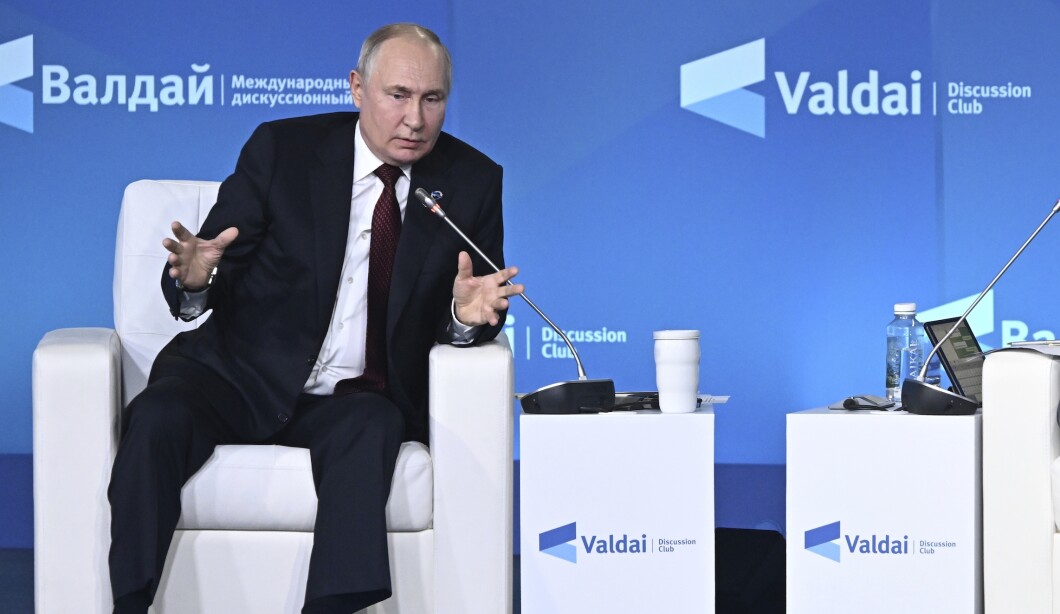
Russian President Vladimir Putin has adopted the rhetoric of multiculturalism to justify the war in Ukraine as part of an apparent initiative to offset the loss of political and economic ties in Europe.
“First, there are many civilizations, and none is superior or inferior to another,” Putin said this week at the Valdai International Discussion Forum. “They are equal since each civilization represents a unique expression of its own culture, traditions, and the aspirations of its people. For instance, in my case, it embodies the aspirations of my people, of which I am fortunate to be a part.”
HOUSE SPEAKER RACE ENDORSEMENT LIVE TRACKER: WHO HAS BACKED WHO SO FAR?
That language represents a tonal innovation on his triumphalist pose as a defender of “Christian values,” which attracted the attention of international conservatives when Russia annexed Crimea in 2014. And it points, Russian and Western analysts suggest, to a Kremlin intent to reorient Russia’s policy away from the West.
“They are cutting ties with here and moving toward a Eurasian path,” U.S. Institute of Peace senior adviser Donald Jensen told the Washington Examiner. “This whole drift of Russia away from the West … has not really been fully explained by people in the West or understood by people in the West.”

An analyst affiliated with Russia in Global Affairs, a journal edited by the moderator of Putin’s question-and-answer session at Valdai, touted his performance as an overture to Chinese General Secretary Xi Jinping.
“Putin’s argument last night about the need for civilizational diversity and the rejection of Washington’s universalist claims has striking similarities to China’s Global Civilisation Initiative,” Dr. Glenn Diesen, an editor of Russia in Global Affairs, a journal led by the Russian foreign policy expert who moderated Putin’s question-and-answer session at Valdai, wrote on social media. “It also harmonizes with India’s ideas about being a civilizational state.”
Yet China and India have an increasingly antagonistic relationship, due in part to a violent border dispute that has galvanized India and the United States to begin “working with each other” to an unprecedented degree.
“It has required both of us really to overcome what my prime minister called the hesitations of history,” Indian External Affairs Minister Subrahmanyam Jaishankar said last week during an event at the Hudson Institute in Washington, D.C. “So how do we create that ability and the convergences and hopefully the comfort to work together? I think that would be very crucial to the future of the Pacific order.”
Putin, for his part, insisted that his invasion of Ukraine represents an attempt to protect a “new international order” from Western hegemony.
“The issue is much broader and more fundamental and is about the principles underlying the new international order,” he said. “Lasting peace will only be possible when … there is a balance in the world where no one can unilaterally force or compel others to live or behave as a hegemon pleases even when it contradicts the sovereignty, genuine interests, traditions, or customs of peoples and countries.”
Putin struck that note on the same day that Ukrainian President Volodymyr Zelensky attended a summit of European leaders in search of new weapons and air defense systems to repel Russia’s expected renewal of attacks on Ukrainian infrastructure through the winter.
Putin at times has invoked Czar Peter the Great’s military victories at the founding of the Russian empire as a precedent for the war in Ukraine. At Valdai, however, he renewed the Kremlin’s attempt to capitalize on anti-Western sentiment in countries that have negative memories of Western European empires.
“Only true cultural and civilizational diversity will ensure peoples’ well-being and a balance of interests,” he said. “The main thing is to free international relations from the bloc approach and the legacy of the colonial era and the Cold War. … You just need to put aside haughtiness and arrogance and stop looking at others as second-class partners or outcasts or savages.”
If that argument enjoys traction among the countries of the so-called Global South, it could run into headwinds as Indian officials continue to coordinate with the United States.
“Now for India, when we confront a largely Western-created architecture, obviously we would like to encourage and facilitate and induce and pressurize changes which are badly needed,” Jaishankar told the Hudson Institute audience. “But it is done as to add a non-Western layer and input. So I make this very important distinction where India is concerned, India is non-Western. India is not anti-Western.”
The Kremlin chief claimed to desire a “new world system” anchored in “the existing system of international law” under the United Nations.
“Russia was, is, and will be one of the foundations of this new world system, ready for constructive interaction with everyone who strives for peace and prosperity, but ready for tough opposition against those who profess the principles of dictatorship and violence,” Putin said.
The idea represented an explicit appropriation of the “new world order” that President George H.W. Bush heralded in the weeks after Iraqi dictator Saddam Hussein invaded Kuwait as the United States prepared to lead a coalition to roll back Iraqi forces.
CLICK HERE TO READ MORE FROM THE WASHINGTON EXAMINER
Putin’s appropriation and re-deployment of that aspiration reflects a pattern of Russian diplomatic rhetoric, Jensen observed.
“He’s sort of double-talking,” the USIP expert said. “They often do that to make the opposite point. … They will say something, not really meaning it in the way that we understand it, and then adopt the rhetoric to pursue their own initiatives. That’s what he’s doing.”





